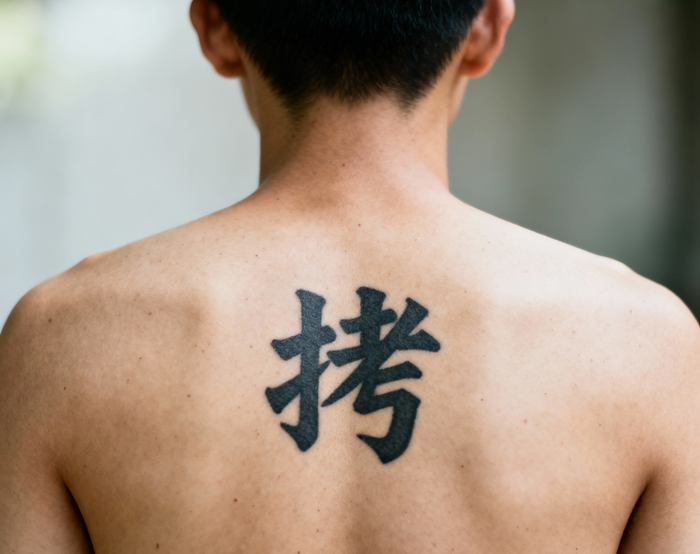
1. Direct Meaning and Breakdown of the Kanji "拷" (Kō)
The kanji 拷 carries a singular, unambiguous, and deeply negative meaning.
Core Meaning: To torture, to torment, to inflict pain to extract information.
Keyword: Physical torture and interrogation.
Pronunciation:
コウ (Kō): The on'yomi (Sino-Japanese reading).
Etymological Breakdown:
The character 拷 is a phono-semantic compound, composed of two parts:
扌 (Tehen - "hand" radical): This indicates an action performed with the hand.
考 (Kō - "to think," "to consider"): This component provides the "kō" sound and contributes the meaning of "investigation" or "interrogation."
Combining these, 拷 creates the conceptual image of "using one's hands in a physical investigation." This is not a gentle inquiry; it is a violent interrogation, the act of inflicting pain to force someone to talk or confess.
Common Usage in Japanese:
This kanji is used exclusively in words related to torture and severe mistreatment:
拷問 (Kōmon): Torture, interrogation by torment. This is the most common and definitive word featuring this kanji.
拷問台 (Kōmondai): A torture device (e.g., the rack).
拷問死 (Kōmonshi): Death by torture.
2. "拷" as a Tattoo: Meanings and Severe Warnings
Choosing "拷" as a tattoo is one of the most dangerous and ill-advised choices possible. Its meaning is associated with extreme cruelty and criminal violence.
Potential Personal Meanings (And Why They Are Problematic):
There are no socially acceptable personal meanings for this character. Any attempt to assign one would be seen as either profoundly ignorant or an endorsement of horrific acts.
A Misguided Symbol of "Inner Struggle": In a highly abstract and naive sense, someone might interpret it as a symbol of "self-torture" or enduring great internal pain. However, the character specifically denotes the act of inflicting physical pain on others. This interpretation would be completely lost and is not supported by any cultural usage.
A "Tough" or "Intimidating" Persona: Someone might mistakenly believe it projects an image of being "hard" or fearless. In reality, it projects an image of being a torturer, a sadist, or someone who glorifies violence.
Severe Warnings and Potential Consequences:
Under no circumstances should you get this tattoo.
Overwhelmingly Violent and Criminal Connotation: To any Japanese person, this character has one primary meaning: torture. A tattoo of 拷 is equivalent to having the word "TORTURE" or "TORMENTOR" tattooed on your body. It is a direct symbol of brutal, illegal, and inhumane activity.
Social, Professional, and Legal Repercussions: This tattoo would immediately brand you as dangerous, untrustworthy, and potentially violent. It would likely lead to:
Complete social ostracism.
Inability to find or keep a job.
Intense suspicion from law enforcement and authorities.
Potential denial of entry to establishments, especially in Japan.
Profound Cultural and Moral Insensitivity: Displaying this symbol shows a total disregard for human rights, ethics, and social harmony. It is one of the most offensive and alarming kanji choices imaginable.
Zero Ambiguity: The character has no positive, poetic, or philosophical interpretations. Its meaning is singularly and powerfully negative.
3. Design and Styling Suggestions
There are no design suggestions for this kanji as a tattoo. The only appropriate advice is an absolute and unequivocal recommendation against its use.
Summary
| Aspect | Explanation |
|---|---|
| Kanji | 拷 |
| Pronunciation | Kō |
| Core Meaning | To torture, to torment. |
| Tattoo Meaning | None. It is universally and exclusively interpreted as a symbol of torture and sadism. |
| Suitability | Catastrophically poor. It is unsuitable for every single person. Getting this tattoo would be a life-altering mistake with severe negative consequences. |
Final and Unequivocal Advice:
Do not get this tattoo. The risk is absolute.
If you are drawn to concepts related to "resilience" or "endurance," use these positive and clear alternatives:
強 (Tsuyoi): Strong.
耐 (Tai): To endure.
忍 (Nin): Endurance, perseverance.
鍛 (Tan): To forge, to temper (as in metal or one's body).
If you are seeking a symbol for a "rebellious" spirit, consider:
反 (Han): Anti-, against.
Choosing "拷" is not a matter of personal interpretation; it is an objective error. It is a symbol of crime and profound human suffering and must be avoided entirely.